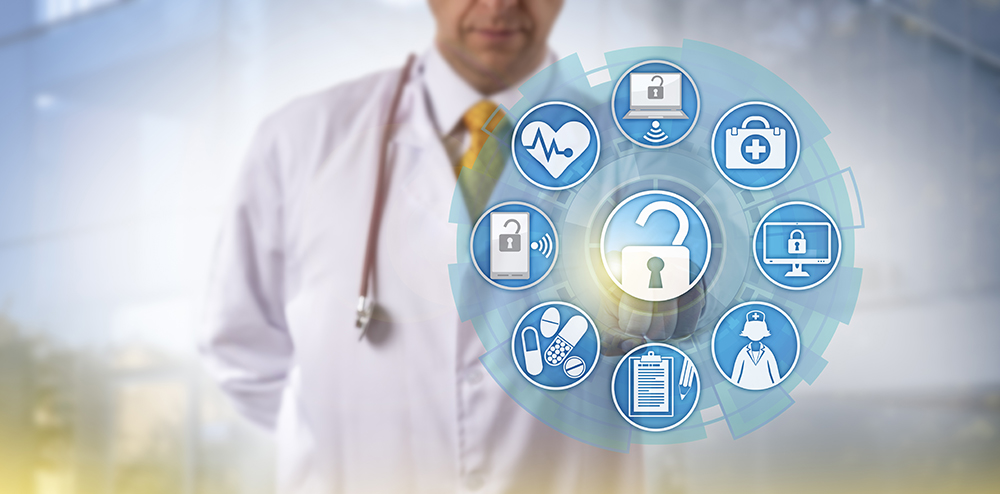Sep 29
2022
Top 5 Healthcare IT Security Tips You Need To Know

With new threats and challenges emerging in the digital world every day, maintaining optimal IT security has become a daunting task for any organization. More than ever before, healthcare organizations are feeling the heat from regulators regarding cyber security. In this blog post, we look at some of the top healthcare IT security tips you should know to keep your organization safe from cyberattacks.
With more than one billion records being compromised every year, data privacy and protection is a topic that cannot be ignored anymore by any organization without risking its reputation significantly. Considering how many patient records are digitized these days, it’s not surprising that hackers are increasingly targeting healthcare companies with ransomware attacks or other ways to get access to confidential information.
Know Your Employees And Monitor Behavior
Healthcare organizations often deal with extremely sensitive data, and thus it’s important that your employees are aware of what information is private and what information can be shared publicly. It’s also important to keep an eye on how your employees are using their devices at work.
If you notice that someone is downloading files from the network that they shouldn’t be accessing, it might be an indication of malicious behavior. It’s also important to keep an eye on the devices your employees are using. If your organization has BYOD (Bring Your Own Device) policies, it’s important to make sure that those devices are secured against malware or other threats.
Ensure Strong Passwords And Network Security
While there are many different ways for cybercriminals to break into your network, weak passwords remain a commonly exploited vulnerability. It’s important to make sure that your employees are using strong passwords containing a combination of letters, numbers, and symbols.
To avoid having to reset passwords on a regular basis, it’s a good idea to suggest the use of password managers. Another important network security tip is to implement two-factor authentication (2FA) for all critical systems. This will help to prevent unauthorized users from accessing sensitive data.
Install An Effective Breach Detection System
All healthcare organizations should have breach detection systems in place to identify potential cyber threats as soon as possible. Specifically, you should be keeping a close eye on unusual activity such as sudden spikes in data transfer or access, use of unusual ports, or other anomalous behavior. If you notice any of these signs, it’s important to investigate as quickly as possible to see if your network has been compromised. The sooner you can detect a breach, the easier it will be to contain it and minimize the potential damage.
Be Careful With Email Communication
Email attacks remain one of the most common ways for cybercriminals to break into networks. While you can’t completely eliminate the risk of being infected by clicking on a malicious link in an email, you can take some precautions to minimize the risk. It’s recommended to configure your email server to filter out suspicious emails and block emails that appear to come from a source that doesn’t make sense.
You should also make sure that your employees are careful about clicking on links in emails. If the email appears to come from someone the receiver knows, it’s important to examine the email carefully to make sure it’s legitimate before clicking on any links. If the email appears to be suspicious, it’s best to not click on any links and report the email to the IT team.
Don’t Forget the Basics Of Computer Security
It’s important to keep in mind the basics of computer security and familiarize yourself with things like the top 10 API security risks, even if your organization has implemented all the above security tips. One of the best ways to keep your company protected against cyber threats is to educate your employees on cyber security best practices. It’s important to train your employees on things like not clicking on suspicious links, avoiding the use of weak passwords, and keeping software up to date.
Conclusion
Healthcare organizations handle extremely sensitive data, which makes protecting this data from cyber threats even more important. To protect your data against cyber threats, it’s important to follow a few healthcare IT security tips. It’s best to regularly update software and computer systems, use strong passwords, and filter out suspicious emails from your inbox. It’s also important to maintain a breach detection system to identify potential cyber threats as soon as possible, and it’s crucial to keep in mind the basics of computer security. With these tips, you can protect your organization from cyber threats and keep your data safe.